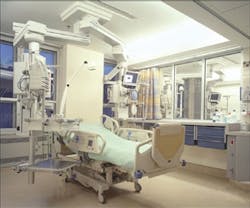Hospital Structure Impacts Infection
Private intensive care rooms may reduce patients’ risk of developing hospital infections, according to a new study by the McGill University Health Centre in Montreal.
Infection control in hospitals can become a life-or-death matter and seriously impact the cost of treatment for patients. Intensive care units are particularly high-risk because patients there are most susceptible to infection.
After changing to private rooms, the research team found that the rate of infection acquisition fell by about 50% for three bacteria of major concern – Staphylococcus aureus, or MRSA; C. difficile; and Enterococcus (VRE). Treatment for each case of C. difficile can cost up to $7,000 per occurrence.
Private rooms also ensure privacy and confidentiality, give patients a sense of control, and allow patients to stay in their rooms for some routine exams and treatments by providing enough space for equipment, the researchers added.
